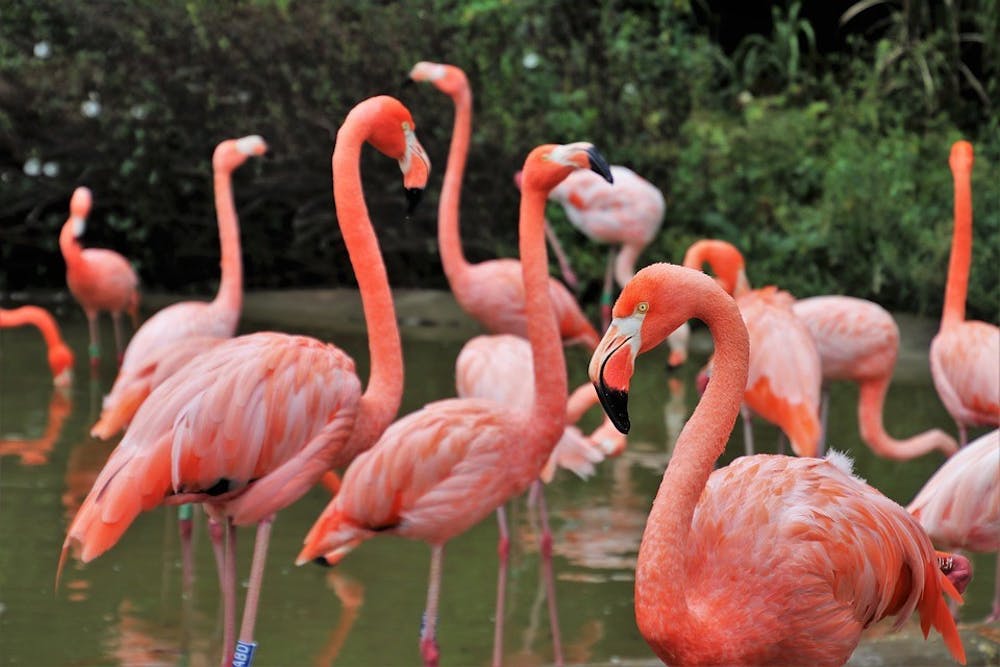By now you have probably seen the viral Planet Earth clip of a courtship dance where a bird of paradise distorts itself into a dabbing, blue, smiley face as a way of asking for its mate’s consent.
You might have also seen the heart wrenching “Polar Bear versus Walrus” clip of a polar bear’s exhausting struggle to prey on a blubbery walrus after swimming for days in an open span of ice-less water. If not, all of you have, at least, been inundated with recent news headlines about climate change and the Green New Deal.
My roommate recently gave me a pin with the words, “Climate Change is Real IDIOTS” that sits on my fake grass desk decoration, a daily reminder that makes me even more cognizant of my individual contribution to our deteriorating environment each time I walk to the trash chute.
Narrated, once again, by the iconic voice of David Attenborough, Our Planet, the eight episode documentary series that came to Netflix on April 7 also screams, “Climate Change is Real IDIOTS,” although much more eloquently in its jaw-dropping shots of impacted habitats across the globe. The series was produced by Alastair Fothergill, Keith Scholey and Colin Butfield alongside the support of Silverback Films and the World Wide Fund for Nature. In Our Planet, we are provided another instance of a bird’s fascinating courtship dance and a polar bear quietly treading across thin ice, but along with these images comes an even stronger message: These rare documentations may be one of the last instances where we are able to witness the creatures that we grew up surrounding ourselves with in the all too familiar Club Penguin igloos or even in our kindergarten textbooks.
The series begins with an opening episode titled, “Our Planet” before taking us across different biomes from frozen worlds to coastal seas, deserts, grasslands, high seas, fresh water and forests. Each episode captures the immense strength of nature’s self-regulating life processes.
A quiet side shot of a lone zebra is followed by a powerful, loud flood that heralds the arrival of bright pink flamingoes on an expansive salt plain glimmering with iridescent algae. An overhead shot shows the circular swirls of mud traps that whales use in their fish hunts before high-technology camera equipment zooms in, delving its microscopic lens into the world of ant colonies found on the floors of tropical jungles.
But these fleeting images of vivacious, nutritious habitats are quickly contrasted to the other half of reality. A baby flamingo is left behind, unable to catch up to the flock of chicks, all because far-reaching temperatures have left the salt from evaporating water to accumulate in chunks around its legs. Arctic glaciers are melting by the second, as highlighted by a three-minute segment in the first episode purely dedicated to showing the abrasion of the ice fronts, accompanied by the horrid sound of melted glaciers plummeting into the sea. Severely overcrowded beaches that are capable of triggering one’s polyphobia have left some walruses to seek higher, rocky grounds to rest, only to leave them with no other option but to drop hundreds of feet below to their death out of desperation for water. This is all because their natural sea ice habitats are no longer readily available.
By the end of the second episode, I was left completely speechless at the sight of countless walrus corpses decomposing beside bodies of water they were supposed to be thriving in. The Atlantic describes it perfectly in their headline, “Netflix’s Our Planet is Beautiful but Uncomfortable.”
While the documentary emphasizes global warming as the most pressing issue, it also documents striking images of palm oil trees infringing on our world’s most diverse forests; agricultural land plots degrading grasslands; bleaching coral reefs under heating water temperatures; and several endangered species facing the consequences of poaching and overhunting.
At the end of each episode, Attenborough encourages us to visit ourplanet.com to learn more about environmental conservation. Upon visiting the website, I was able to watch a few more short segments, the very first titled, “How to save our planet” where Attenborough takes us from the beginning of nature to the modern day Anthropocene, promoting these four action points for a sustainable future: Reduce our usage of fossil fuels; consume less meat and engage in more efficient production of food sources; regulate fishing to protect oceans; and restore our world’s biodiversity.
While I don’t think these action points and the concerns about our environment are necessarily revolutionary thoughts, Our Planet exposes rarely encountered disturbances to cycles in nature that remind us, or have reminded me at the very least, that our control over the planet must not be rationalized in accordance to solely the human species. Our Planet is a call to action, one that acknowledges Earth’s intense wonders and prompts us to save it.





